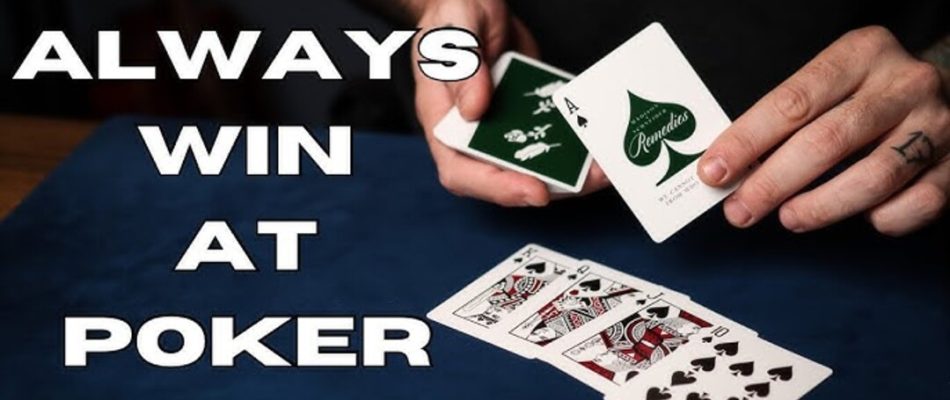How to Always Win at Poker: Rules and Tips

Poker remains one of the most popular and engaging card games in the world. It offers a perfect balance of skill, strategy, and a touch of luck, making it an enduring favorite for casual players and professionals alike. Played by millions globally, poker is a game that transcends cultures, uniting players through its rich tradition. Whether you are a novice just starting or an experienced player looking to refine your techniques, understanding the nuances of poker is essential for mastering the game. To truly excel, players need to invest time in learning the fundamentals, analyzing gameplay, and developing strategic thinking.
The Basics of Poker
Poker is a card game involving betting, strategy, and the ability to read your opponents. The game can be played in various formats, such as Texas Hold’em, Omaha, and Seven-Card Stud. Each variation comes with its own set of rules and dynamics, ensuring that players remain engaged and challenged. Regardless of the variation, the fundamental goal remains the same: to win the pot, which consists of the bets made by all players in a hand. Understanding hand rankings, betting rounds, and position at the table are key aspects that every player must master. The standard 52-card deck is used, and the game typically requires at least two players. However, there are creative ways to play poker alone to hone your skills, which we will discuss later.
How to Play Poker Alone
Playing poker by yourself might sound unusual, but it’s an excellent way to practice and refine your strategies. Solo poker allows you to simulate game scenarios, test betting patterns, and analyze your decision-making process without the pressure of real opponents. This form of practice is particularly helpful for beginners who want to learn at their own pace and for seasoned players aiming to polish their strategies.
- Set Up a Practice Game: Use two or more “dummy” hands to simulate a multi-player environment.
- Deal Cards and Play Both Sides: Alternate playing each hand as though you were different players.
- Analyze Betting Scenarios: Practice betting strategies and assess how you would respond to specific moves.
- Focus on Probability: Use solo play to understand odds, such as the probability of landing a flush or full house.
By using this method, you can sharpen your ability to make calculated decisions, an essential skill for mastering the game. This self-guided approach also helps in understanding the psychology of poker, such as anticipating bluffing tactics or reacting to aggressive bets. As you practice, you’ll notice improvements in both your technical gameplay and your confidence at the table.
Can You Play Poker By Yourself?

Yes, you absolutely can play poker by yourself. Solo poker can serve as a valuable tool to understand game mechanics better, study different hands, and simulate complex betting scenarios. The ability to control and replay hands offers players an opportunity to study outcomes and refine their strategies.
Using poker apps, specialized tools, or just a standard deck of cards, you can recreate realistic game situations. For instance, practicing the odds of improving your hand after the flop or analyzing how your position affects your betting strategy can be game-changing. This hands-on approach allows you to explore advanced techniques and build a deeper understanding of probabilities and decision-making. Solo practice enables you to approach the table with confidence and a stronger grasp of the game.
How to Always Win at Poker: Tips and Strategies
While no strategy guarantees a 100% win rate, you can significantly improve your chances by following proven techniques. Success in poker often depends on a combination of skill, adaptability, and mental fortitude. Knowing when to bet, raise, fold, or bluff can mean the difference between a big win and a costly loss. Key Strategies to Improve Poker Performance:
- Master the Basics: Understand hand rankings and the rules thoroughly. Knowing which hands are worth playing and when to fold will prevent unnecessary losses.
- Read Opponents: Observe their betting patterns, physical tells (in live games), and timing. This helps you predict their moves and counter them effectively.
- Manage Your Bankroll: Set limits to avoid overspending and ensure long-term playability. A disciplined approach to money management can sustain your gameplay over time.
- Adopt a Balanced Style: Alternate between aggressive and conservative strategies to keep opponents guessing. This unpredictability can lead to more winning opportunities.
- Play Position Smartly: Being in a late position gives you more information about other players’ actions, which is an advantage. Leverage this to make more informed decisions.
| Poker Statistic | Percentage Likelihood |
|---|---|
| Odds of being dealt a pair | 5.88% |
| Flopping a flush | 0.84% |
| Completing a straight draw | 31.5% (with four outs) |
These probabilities highlight the importance of knowing when to bet aggressively and when to fold. Additionally, understanding these odds helps you calculate pot odds and make mathematically sound decisions during gameplay.
Mental and Emotional Discipline in Poker
One often-overlooked aspect of poker is the mental game. Poker requires emotional control, patience, and the ability to make rational decisions under pressure. Players who excel at the mental aspect of poker often outperform those who rely solely on technical skills.
- Avoid Tilt: “Tilt” occurs when emotions cloud judgment, leading to reckless decisions. Recognizing this state early and taking corrective measures can save you from significant losses.
- Think Long-Term: Short-term losses are part of the game. Focusing on the long-term benefits of disciplined and strategic play ensures consistent improvement.
- Develop a Routine: Professional players often use pre-game routines to center themselves and improve focus. Whether it’s a breathing exercise or a review of strategies, preparation enhances performance.
Poker is as much about mental resilience as it is about technical skill. Staying composed and focused during intense moments is what separates average players from great ones. By cultivating these qualities, you not only improve your game but also develop valuable life skills.
The Future of Poker: Solo Practice and Online Play
As technology evolves, online platforms and poker tools make it easier to practice alone. Simulated environments and AI opponents provide a realistic training ground, helping players fine-tune their strategies. The convenience of online tools allows players to experiment with various tactics and gain insights without the constraints of physical games.
For beginners, solo practice is invaluable for understanding the game’s fundamentals. By removing the pressure of competition, players can focus entirely on learning and improving. For advanced players, it offers a chance to experiment with new tactics and refine decision-making skills. Whether playing for fun or preparing for high-stakes games, consistent practice will always be a key factor in improving your skills.
Final Thoughts
Poker is a game of skill, patience, and strategy. By dedicating time to practice—whether alone or with others—you can significantly enhance your understanding and performance. Each game presents an opportunity to learn, adapt, and grow as a player.
Whether you’re wondering how to play poker alone, considering if you can play poker by yourself, or striving to uncover strategies on how to always win at poker, the journey to mastery is both challenging and rewarding. By staying committed to learning, practicing diligently, and maintaining discipline, you can elevate your game to new heights. As you refine your skills and strategies, remember to enjoy the process. Poker is more than just a game; it’s an exercise in critical thinking, emotional control, and adaptability. With the right approach, you’ll not only become a better player but also develop skills that can benefit other areas of life.
FAQ
Poker can be played with as few as two players (heads-up) or as many as ten players in a standard game. Some formats, such as online poker, can accommodate even more players.
Yes, playing poker alone is a great way to practice. You can simulate game scenarios, deal hands for multiple “players,” and test different strategies. Many poker software programs and apps also allow solo practice against AI opponents.
The odds of being dealt a royal flush, the highest possible hand, are approximately 1 in 649,740. It is an exceptionally rare event, making it one of the most celebrated hands in poker.
Tilt refers to a state of emotional frustration or anger that causes a player to make irrational decisions. It often occurs after a losing streak or a bad beat. Managing tilt is critical for long-term success in poker.
Bluffing involves making opponents believe you have a stronger hand than you actually do. Successful bluffing requires timing, reading your opponents, and understanding their tendencies. Overusing bluffs can backfire, so balance is key.
Bankroll management refers to controlling how much money you allocate for poker. Good bankroll management ensures you don’t risk more than you can afford to lose. A common guideline is to play with no more than 1-2% of your total bankroll in a single session.
Poker is a mix of both skill and luck. While luck plays a significant role in the short term (e.g., the cards you’re dealt), skill becomes the dominant factor over the long term. Experienced players can consistently outperform less skilled opponents.